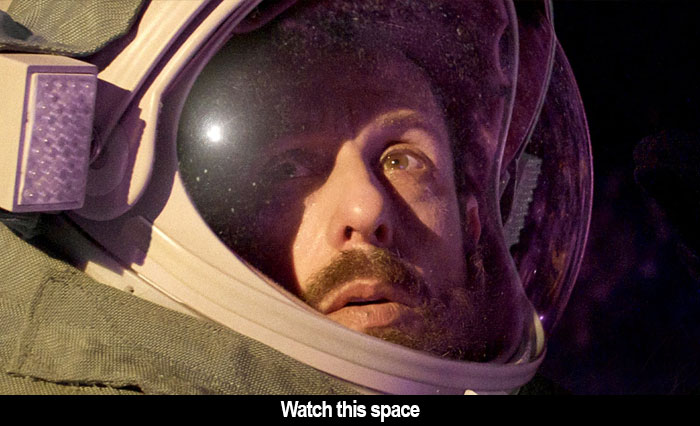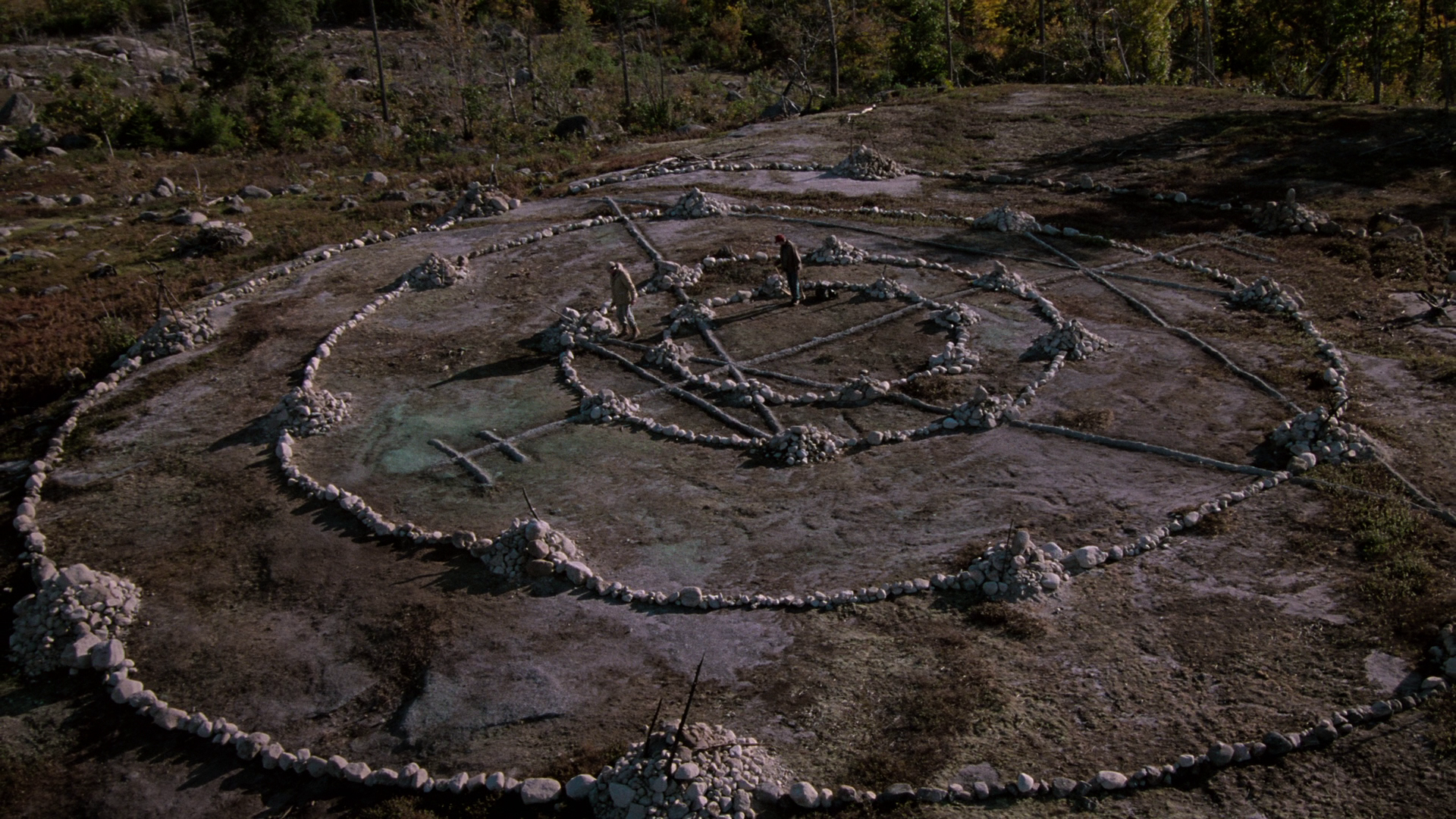SPACEMAN
**/****
starring Adam Sandler, Carey Mulligan, Paul Dano, Isabella Rossellini
screenplay by Colby Day, based on the novel Spaceman of Bohemia by Jaroslav Kalfař
directed by Johan Renck
SOMETIMES I THINK ABOUT DYING
**/****
starring Daisy Ridley, Dave Merheje, Parvesh Cheena, Marcia DeBonis
written by Kevin Armento, Stefanie Abel Horowitz, Katy Wright-Mead
directed by Rachel Lambert
by Walter Chaw Its basic set-up is like Duncan Jones’s Moon: a lone astronaut, far from home and tethered only by occasional contact with the partner he’s left behind on Earth, finds some solace in conversations with an alien/artificial intelligence. But this genre of listless Rocket Men and their internal melodramas traces back to Douglas Trumbull’s Silent Running, right? Or that 1964 episode of the original “Twilight Zone”, “The Long Morrow”? Apocalypse-tinged futureworlds centred around Byronic heroes. Where its antecedents rarely showed the strain of their creation, however, Johan Renck’s Spaceman (an adaptation of Jaroslav Kalfař’s Spaceman of Bohemia) often does. It has good taste, and maybe even the right idea in putting a man in isolation in order to Altered States him into a cleaner understanding of his essential self, but it’s better at pounding out the notes than it is at hearing the music. While I didn’t hate it, I am, I suspect, squarely in its target audience of pretentious, sad, The Fountain-loving Proust-readers, so it never drowned me like I hoped it would. Me, whose pockets are always filled with the smooth rocks I picked along the shore.
Jakub (Adam Sandler) has been away from home for months, and many more will pass before his return. He’s the architect of a journey of great scientific and philosophical importance, separating him from long-suffering wife Lenka (Carey Mulligan). Lenka wants a divorce, but because Jakub’s in a fragile state as it is, his terrestrial handlers choose to withhold this from him, fearing the fallout it could have on a mission that is vital to science and the furtherance of knowledge. This is likely an allegory for how men and their feelings are privileged over that of their wives, or how a man’s state of mind is more precious than a woman’s (mainly because a man’s expression of emotions is more novel), or how men aren’t very good at reading the signs that their loved ones are in pain. Is “allegory” even the right word in cases like this? Can something be an “allegory” if it’s so unsubtle as to be the literal and sole text of a piece? When a lonesome guy who spends his life playing video games and pining for his upstairs neighbour finds meaning in a relationship with an AI in Her, for instance, there is subtext to mine for an emotional payoff. Jakub’s emotional dissociation is the only problem Spaceman must solve. The space MacGuffin, as it were, is so diaphanous I never for a moment understood it as anything other than a distraction.
No, male loneliness is the entire fulcrum of the picture’s new-age bildungsroman. There is nothing else. It is the emo manifestation of solipsistic obviousness even with the introduction of an expository device in the form of Hanuš (voiced by Paul Dano), a giant spider who appears to Jakub to ask accidentally pithy questions about Jakub’s deficiencies. I wanted Spaceman to be more than the movie equivalent of Fall Out Boy, though I’m comfortable with disappointment. I wish it had more faith in Sandler’s ability to carry solitude, but it’s crowded with flashbacks, hallucinations, dream sequences, and various sundry narrative devices and expository crutches. Max Richter’s beautiful score becomes emotional wallpaper with overuse and repetition; Joachim Trier’s favourite DP Jakob Ihre’s lush, super-saturated cinematography is largely spent shooting either things that are already intrinsically beautiful or a dirty Sandler floating around a crowded set; and after all is said and done, it feels like Spaceman‘s message of gathering yon rosebuds whilst one might has been told with more subtlety and purpose and most importantly attached to stakes greater than the fate of the subject of a Peter Schilling novelty song. Does the Charlotte’s Web conceit work with Hanuš gently urging his “some pig” to tell his wife he loves her? I mean, what do you think?
Charting the same brooding doldrums, Rachel Lambert’s office melodrama Sometimes I Think About Dying follows sad, introverted Fran (Daisy Ridley) as she tentatively makes a connection with new guy Robert (Dave Merheje), going out on a couple of dates and attending a mystery dinner party with him before screwing it up by being a social weirdo. She fantasizes about various tableaux morte in which she’s the centrepiece, and when asked, she manages to describe how maybe the sensation of drinking acid would be “nice,” like using hand sanitizer on her insides. If only the rest of the film were odd like this: perverse rather than mopey; invested in the off-putting rather than aspiring to normalcy. I didn’t appreciate how much it feels like it’s encouraging us to root for Fran to stop being who she is. This has to do with how most of the first half of the film is a lot of Fran sitting at her cubicle, Fran having trouble coming up with something to write in a retirement card for one of her co-workers, Fran being a disaster at making small talk and her decision not to tell someone she likes how much she hates his taste in things. Travis Bickle is also an eccentric loner with issues managing social cues and romance, but Travis Bickle doubled as a metaphor for broader systemic dysfunctions: the way we treat mental illness, veterans of unpopular wars, or unhinged vigilantes who gratify our hardwired fascination with the western mythos. Fran is merely your awkward co-worker about whom you’ll find, once you poke beneath the surface, that your suspicions about her being a little dull and strange in an unproductive way are basically justified.
I didn’t dislike Sometimes I Think About Dying in almost exactly the same way I didn’t dislike Spaceman. Both are about essentially simple people undergoing what would, for others, be complicated existential crises. Both are filmed in a slightly surreal, inarguably lovely, professional way that speaks to a respect for craft. And both are texts without subtext. Jakub is lonesome and isolated; Fran is lonesome and isolated. Jakub has a block that prevents him from fixing these states for himself, and Fran…yeah, likewise. Jakub develops a space spider to help him work through some shit, while Fran imagines herself hanging from a crane or being eaten by bugs on a beach, presumably so she can be discovered and depth projected upon her now-blank canvas like the vacuous victims of Veronica and J.D. in Heathers. What’s better–I mean, who am I to judge? Still, I do worry that movies like this are put-ons in the way I have found Ari Aster’s horror films to be put-ons: stories about actual pain and suffering that grow uglier the more they betray the teller as a bit of a tourist, a bit of a sideshow barker. More likely, they’re just playing this tune I know by heart in a register I can’t hear because, I mean, it doesn’t belong to me. At the end of the day, there’s enough of this chronic depression pie for everyone to get a nice, giant slice.






